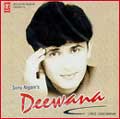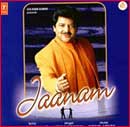'Main sangeetkaaron ko laaya hoon'
Dr Rajiv Vijayakar
Faaiz Anwaar wears a trendy checked shirt and jeans, puffs away incessantly at a
cigarette and seemingly talks to the ceiling fan in his cubby-hole
office.
Well, isn't that against the traditional image of a shaayar?
"Poetry does not need a particular kind of packaging," he replies. "I am
a poet of the 21st century. I wear jeans and write poetry in a language
that is rich and completely Indian."
 Faiz Anwaar's spelling has recently undergone a numerology-driven change
to Faaiz Anwaar.
Faiz Anwaar's spelling has recently undergone a numerology-driven change
to Faaiz Anwaar.
Though Anwar had admitted to changing his name to a publication some months ago, today, he denies it.
"I always had my name spelt like this," he says, in total contradiction to the inlay credits of his
earlier films. "Faaiz, not Faiz, is the correct spelling for my name
phonetically. Also, I am Anwaar, which means the origin of light, while
Anwar means light itself!"
The Kanpur-born poet who loved to write since his school days came to
Bombay on a holiday. He met Roopkumar Rathod at a ghazal concert in 1989.
Roopkumar was very impressed with his poetry. So he sent Faaiz to his brother Shravan, who along with music partner Nadeem, were trying to make it big at that time.
Equally impressed, Nadeem and Shravan introduced him to Mukesh Bhatt, Mahesh Bhatt and Gulshan Kumar.
"The recordings for the film Aashiqui were on," recalls Faaiz.
"Someone had written a song called Aao Ke Pyar Hum Karen to a Nadeem-Shravan tune. But they were not too happy with the lyrics and
asked me to write a song to the same metre.
Within a very short time I wrote Dil Hai Ke Manta Nahin, Yeh Beqaraari Kyoon Ho Rahi Hain, Yeh Jaanta Hi Nahin...
The words fitted their next film's subject so well that the Bhatts and Gulshanji immediately shifted the song to their film, Dil Hai Ke Manta Nahin as its title song. In fact, as you can see, the song
decided the title of the film.
 This was Faaiz's first break.
This was Faaiz's first break.
Faaiz Anwaar also penned a song in Saajan - Pehli Baar Mile Hain.
But after this, he never worked with Nadeem-Shravan again. When asked why, he said, "I would not
like to say anything, but in this lifetime I will never work with them!'
The Bhatts and Gulshan Kumar signed him for Jaanam, directed by Vikram Bhatt with music by Anu Malik.
Anu was very supportive and Faaiz wrote lyrics for Imtihaan, Naaraaz, Vijaypath and Surakshaa.
But though Imtihaan boasted of hits like Iss Tarah Aashiqui Ka, Chhudake Daaman, Do Baatein Ho Sakti Hai, Ek Yaad Ke Sahaare and Dheere Dheere Pyar Ko Badhana Hai, Faaiz's career faced an inexplicable lull.
It picked up again with the T-Series record-smashing album Deewana composed by Sajid-Wajid and sung by Sonu Nigam in 1999.
Would he have made it earlier if big composers had backed him more? Puffing away at a cigarette, Faaiz says, "Shaayari sangeetkaar ko leke aati hain, sangeetkaar shaayar ko kya leke aayenge?" (Poetry makes a
music director's career, not the other way round.)
"No one knew composer Shandesh Shandilya before the album I Love You and Sajid-Wajid before Deewana.
"Nikhil-Vinay were down when I gave them the hit album Jaan. Main sangeetkaaron ko laaya hoon, saahab!" he repeats.
After Deewana's smash success, he has always been with T-Series. But Faaiz is still humble about the role of T-Series in his career. "They gave me my first break and have been very loyal to me. We have done so many albums together, including Ishq Hua, Jaanam and Ashiqui, all of
which were very big hits.
 They have given me complete freedom. But I will not do private albums elsewhere. In films, I will remain a freelancer."
They have given me complete freedom. But I will not do private albums elsewhere. In films, I will remain a freelancer."
Does he find any difference between writing for albums and films? "In
albums, I can give rich poetry. There is greater freedom. In films, we
have to cater to certain requirements. But I can manage both!
"In fact, I am capable of working alone on the entire film, as a solo lyricist," he declared. "I'm doing Tum Haseen Main Jawab with Anand Raaj Anand, Pyaasa with Sanjeev-Darshan and Dil Ne Kahaa with Sajid-Wajid.
Besides these, I'm doing three films with Nikhil-Vinay, Khona Tha Dil Khone Laga and Tum Bin are T-Series productions, and Kab Kyoon Aur Kahan is a Priyadarsan film with Anu
Malik.
But the lyricist has to be an all-rounder. Doesn't his fondness for poetry find this a problem? "I have no problem. 90 per cent of songs are of the romantic kind. I can write any kind of song." He cites
the example of Line Maar Le which he wrote for Humse Badhkar Kaun in 1998.
He stressed that he has always promoted poetry against the trend of the time. "I Love You and Deewana came when pop music was considered fashionable, and proved much more popular than them!" he points out.
His idol is the late Sahir Ludhianvi, who also claimed to have a superior status over the composer.
Says Faaiz, "The songs of Deewana
were finalised only between Bhushan Kumar of T-Series and me. The music directors came in later by mutual agreement."
 He admits that he had to make several compromises in his struggle phase. "But now, I only work on my terms.
He admits that he had to make several compromises in his struggle phase. "But now, I only work on my terms.
"Today's lyricists have little originality or depth because writers merely recycle the thoughts and work of the great masters rather than create from within, but this does not apply to me at all," he says
grandiloquently.
"My lyrics are simple but meaningful and completely original. Do Baatein Ho Sakti Hai Sanam Tere Inkaar Ki, Is Tarah Aashiqui Ka Asar Chhod Jaaoonga and Dil Hai Ke Manta Nahin are
concepts that have never been used before."
"Meri apni ek soch hai," (I have my own way of thinking) he says. "I write from my heart. I do not bend to the market to
the extent that my poetry suffer. Main shaayar pehle hoon, phir
geetkaar. (I am a poet first, and then a lyricist)
Besides, it is very important for a good poet to have been unsuccessful in love. Whether this saddens him to a komal junnon (intense passion) or envelops him in flames of anger, great poetry is born.'
Is he in that category?
"Zaahir hai!" he says, and clams up.